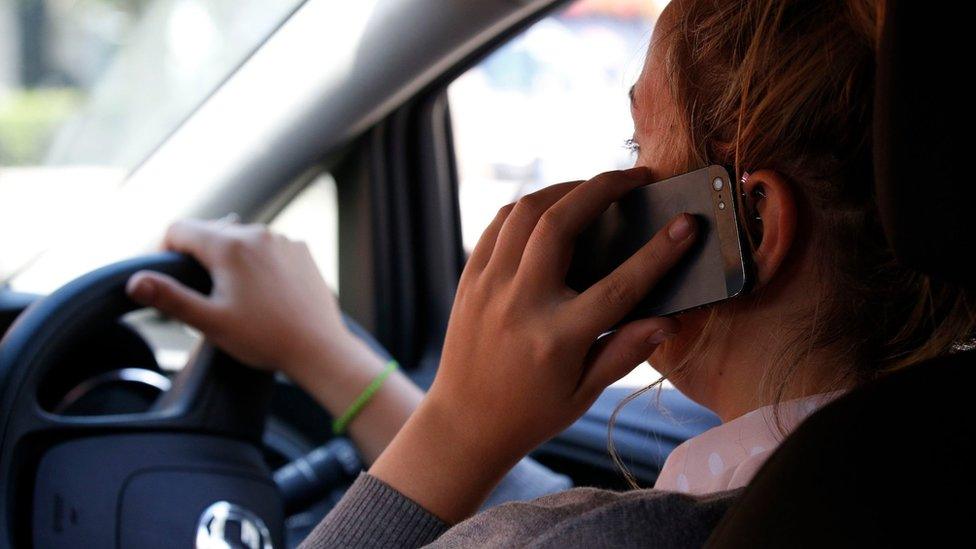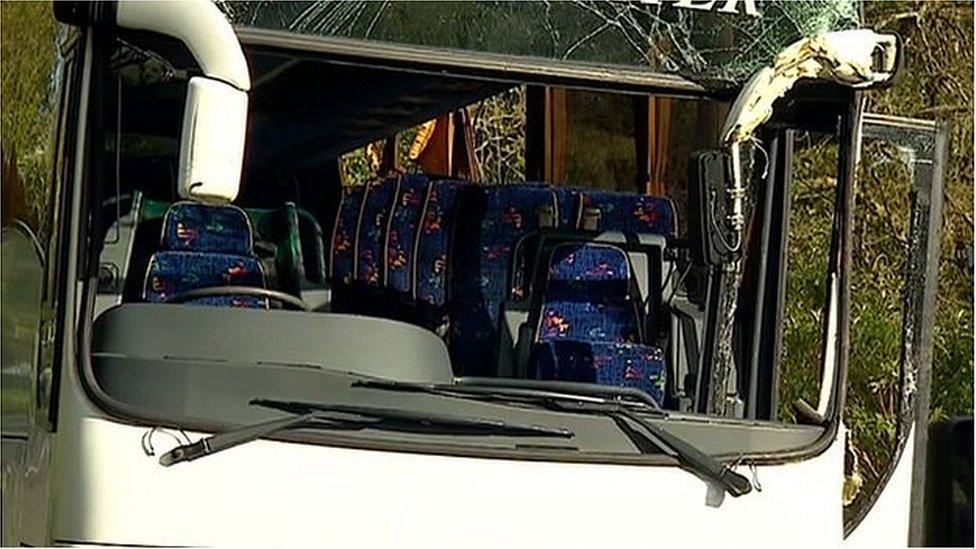Motorists take photos and videos at the wheel, says RAC
- Published
The driver who caused Liese Bowers-Straw injuries deleted their call log and texts
The number of motorists illegally using mobile phones while at the wheel is rising, an RAC survey suggests.
It says 31% of motorists said they used a handheld phone behind the wheel compared with 8% in 2014.
The number of drivers who said they sent a message or posted on social media rose from 7% to 19%, while 14% said they had taken a photograph or video while driving.
The RAC's annual Report on Motoring, external surveyed 1,714 UK motorists.
The breakdown organisation said the use of handheld mobiles was "the biggest road safety concern among motorists today".
It believes a 27% drop in full-time dedicated roads policing officers in England and Wales - excluding London - between 2010 and 2015 means drivers do not fear they will be caught for offences not detected by automatic cameras.
It is illegal to drive a car or ride a motorcycle, external using a handheld phone. Drivers can get an automatic fixed penalty notice, three penalty points and £100 fine. The case could also be taken to court, where the maximum fine is £1,000 and licence disqualification.
Department for Transport figures show that a driver impaired or distracted by their phone was a contributory factor in 492 accidents in Britain in 2014 - 21 of which were fatal and 84 classed as serious.
The survey also found:
7% of those who admitted using a mobile while driving said they did it because they knew they would get away with it
23% claimed it was an emergency, 21% said they needed information for their journey and 12% said it was a habit
The government is due to publish the results of a consultation which proposes introducing tougher punishments for illegal mobile use by drivers.
The minimum fine for non-HGV drivers is expected to rise from £100 to £150, while penalty points are set to increase from three to four.

There are calls to make phone usage at the wheel as socially unacceptable as drink-driving
Transport Secretary Chris Grayling told the Commons he would shortly be announcing "tough plans" to tackle the use of mobiles by drivers.
"This requires, in my view, strong action. This is happening far too often," he said.
Nazan Fennell's 13-year-old daughter, Hope, was killed in 2011 when she was hit on her way home from school by a lorry, whose driver was texting his girlfriend.
Ms Fennell told the BBC's Victoria Derbyshire programme the issue needed to be tackled in the same way that smoking had been made "anti-social".
She also said the United States was "ahead of us for finding solutions about this" and called for a similar campaign to the one launched there by broadcaster Oprah Winfrey, whose No Phone Zone, external initiative raises awareness about driving safety.

'He shouldn't have been on the road'

Lee Martin was riding his bike as part of an organised event in Hampshire
Cyclist Lee Martin, 48, from Basingstoke, was killed when he was hit by a van going at 65mph on a clear road on 12 August 2015.
The driver, Christopher Gard, 30, of Alton, was writing a text message behind the wheel - an offence he had been caught doing several times before.
Lee Martin's brother Darrell said that when he was told of his brother's death, he hoped it had been in an accident that was unavoidable. But when the case went to court, it became clear that Gard had been caught texting at the wheel eight times before.
"His text messages were inane. They were about how he was going to meet his mate later and take his dog for a walk. And that's what killed my brother. It's horrendous."
Darrell also describes Gard being sentenced to nine years in prison as a "very strange sense of victory in a horrible situation".
"The issue for me is that he shouldn't have been on the road in the first place. There were eight opportunities before this to stop the man from driving around.
"People seem to think it's a right to drive a car. Surely it's a privilege."

RAC road safety spokesman Pete Williams said: "It is alarming to see that some drivers have clearly relaxed their attitudes to the risks associated with this behaviour but more worrying is the increase in the percentage of motorists who actually admit to using a handheld device when driving.
"The fact that drivers have little or no confidence that they will be caught when breaking these laws is a likely contributor to the problem and it is sadly the case that every day most road users see other drivers brazenly using their handheld phones when in control of a vehicle - a sight which should be a thing of the past."
Chief Constable Suzette Davenport, of the National Police Chiefs' Council, said: "We share the RAC's concerns about the level of mobile phone use by drivers, particularly as phones are becoming 'smarter'. Our approach is a blend of education and enforcement.
"We run national operations and forces take action locally. We will continue to stress the dangerous consequences, and arrest offenders but we also need people to take responsibility for their behaviour behind the wheel and exert some social pressure on family and friends who take this risk."
'Emotive message'
Paul Jordan, of the McGarryBowen advertising agency, says there needs to be "a really hard-hitting campaign to jolt people out of their complacency around mobiles at the wheel".
He told BBC Radio 4's Today programme: "The key is that the message that government has around this is such a shocking and very emotive message that you don't need the huge media spends to cut through the normal mush of radio and TV advertising.
"It's important to remember that with drink-driving and seatbelts, there was something like 20 years of concerted advertising that went around that. So behaviour change doesn't happen overnight."
A government spokesman said the UK had some of the safest roads in the world and that using handheld mobile phones while driving was "totally unacceptable".
He added: "Offenders involved in road accidents while using a mobile phone already face serious offences such as causing death by dangerous driving, which can carry a substantial prison term.
"We have also proposed tougher penalties for mobile phone use to act as a deterrent and ensure it is not tolerated in society."
- Published23 August 2016

- Published12 September 2016
